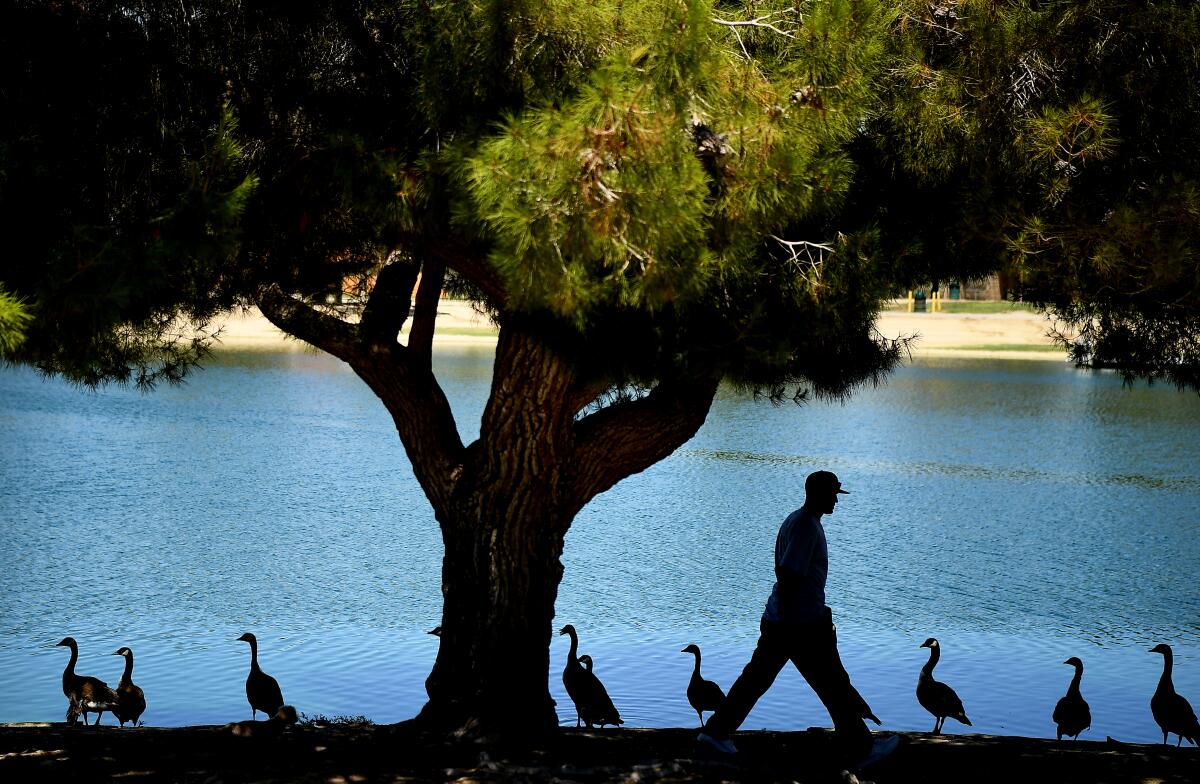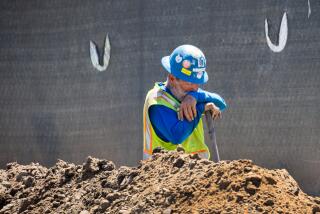Excessive heat bearing down on Southern California

After a broiling Fourth of July holiday weekend, temperatures are expected to keep climbing across Southern California.
The heat is expected to build throughout the week, with highs soaring into the triple digits in some parts this weekend.
The National Weather Service predicts excessive heat will be possible Friday through Sunday, with temperatures reaching highs of 100 to 112 degrees in the Antelope Valley and the interior of San Luis Obispo County.
The region’s valleys and lower mountains may reach highs of 90 to 100 degrees, while temperatures in the coastal areas are expected in the mid-70s to mid-80s.
Along with the increased heat comes an elevated risk of brush fires. During the Independence Day weekend, fire crews worked across the state to contain multiple blazes that were stoked by hot, dry conditions.
The Tumbleweed fire in the Gorman area has scorched 1,000 acres, at 65% containment as of Tuesday morning. Capt. Ron Haralson expressed concern over the rising temperatures, given that vegetation in the area is extremely dry.
Meanwhile, fire crews are continuing to battle the Lava fire, Salt fire and Tennant fire in far Northern California. Nearly 50,000 acres have been burned between the three blazes.
“There is rapidly becoming no more wildfire season. It’s becoming a sad year-round reality here in Calif.,” one Twitter user posted on July 1 regarding the three wildfires.
“What we’re seeing early in the season are very intense, high-pressure systems, which are desiccating the fuel load,” said retired oceanographer and climatologist William Patzert. “Ignition seems to be pretty easy these days.
“Most of these fires are started either intentionally or accidentally.... It can be a cigarette butt, it can be a cigar butt, it can be parking a hot catalytic converter over dry grass,” he said. “People have to be very careful.”
The threat of monsoonal weather is also lurking on the horizon later this week, according to the National Weather Service. “Midlevel moisture and elevated instability” are expected to move over Santa Barbara and San Luis Obispo counties Wednesday and Thursday, forecasters said.
Though thunderstorms do not appear likely, they could produce dry lightning if they develop.
Dry lightning is responsible for some of California’s biggest blazes over the decades. Last year, lightning-sparked fires in the Bay Area merged together to form some of the largest wildfires in California history. The Lava fire, currently over 25,000 acres and 71% contained, was ignited amid 83 lightning strikes on June 24.
Although there are no heat advisories in place in Los Angeles County, the weather service has said this weekend is “looking like a slam dunk for heat warnings” in the Antelope Valley.
Officials recommend drinking plenty of water, exercising caution while working or playing outside and never leaving children or pets in the car.
Even those taking precautions — particularly the elderly, children and other vulnerable populations — can be harmed by the heat. “Most poor neighborhoods in Los Angeles don’t have AC,” said L.A. resident Meggan Anderson on Twitter. “We hit triple digit temperatures all the time.”
Those experiencing heat-related symptoms such as high body temperature of 103 degrees or higher, nausea and dizziness should seek immediate medical attention, according to the L.A. County Department of Public Health.
Free, air-conditioned cooling centers are available across L.A. County. Additional tips for high-temperature days can be found here.
An air quality advisory was in effect in Los Angeles, Orange, Riverside and San Bernardino counties on Sunday and Monday because of Fourth of July fireworks.
Though air quality was considered unhealthy on Monday in L.A., the South Coast Air Quality Management district upgraded its forecast to moderate — though still unhealthy for sensitive groups — on Tuesday.
More to Read
Sign up for Essential California
The most important California stories and recommendations in your inbox every morning.
You may occasionally receive promotional content from the Los Angeles Times.











